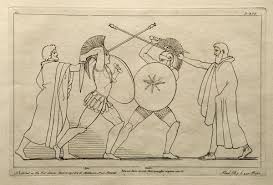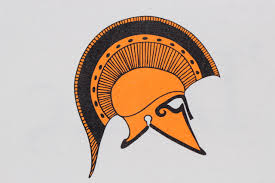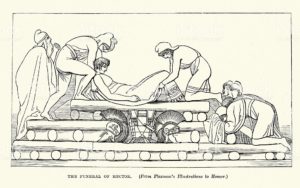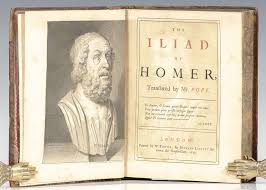The flu came on quickly. I had hiked for an hour near the house and was feeling fit and quite proud of myself. Almost athletic, I thought, in an aged sort of way. As I wandered around the house wondering which of many tasks I should take on, I felt a chill. Like a fine racehorse, I thought, cooling off after a workout. I imagined myself giving a little snort, stamping a proud foot. And then as so often happens when one is at one’s proudest, I began a slow descent into the real world. I put on a sweater to check the chill. Later I added a vest, and then a wool scarf. Finally, confessing to Roberto that I might be getting sick, I put on his down jacket.

And indeed I was. The fever shot to 102 that night. My joints ached. I lay in bed squirming, muttering, hallucinating about sweaty racehorses and bonfires of bones. In the morning I gave in and set up shop on the couch in the living room. I had no taste for TV, my eyes burned and I couldn’t concentrate on a book anyway, so I signed up for Audible Books on my iPhone and began to browse. I was despairing at the endless scroll of romances and thrillers, when Homer’s “The Iliad” appeared. How could this be? Was I hallucinating again? I clicked play and was joined on the couch by Dominic Keaton, a deep-throated English male reader, who took me to the wine-dark sea, and showed me the rosy fingertips of dawn. Thus began 19 hours of poetry and drama as I lay huddled under comforters, brow fevered, and traveled with the men and the gods to Troy to bear witness to horrific bloody battles, psychological intrigue, deceit, heroism, jealousy, despair, hope, revenge, tenderness – all those qualities of humans, and their shadow gods and goddesses, that we know so well.
As my own bones ached, I hear brave Antilochos, son of Nestor, cry in agony as he is pierced through the neck by the enemy’s awesome spear. He falls to the ground, fists clenching the earth. Tears flow from my feverish eyes as Hector, of the shimmering helmet, bids farewell to his wife. He asks her to be proud of him if he should not return from battle, and leans down to kiss his baby son, who cries at the sight of his father’s fearsome helmet with the horse hair ridge and brilliant metal. Laughing, Hector takes his helmet off, and lifts his son in his arms, as his wife’s embrace encircle them both. I am in disbelief as Athena of the gleaming eyes tricks the god-like Achilles into battle with flattery and then shrouds the enemy Trojans in mist so that he cannot take down one foe. I chuckle as Hera, of the white arms, seduces Zeus, gatherer of clouds, who favors Troy in battle, and then slips him a sleeping potion so that she may insure a victory for the Greek Agamemnon over the Trojans.
sight of his father’s fearsome helmet with the horse hair ridge and brilliant metal. Laughing, Hector takes his helmet off, and lifts his son in his arms, as his wife’s embrace encircle them both. I am in disbelief as Athena of the gleaming eyes tricks the god-like Achilles into battle with flattery and then shrouds the enemy Trojans in mist so that he cannot take down one foe. I chuckle as Hera, of the white arms, seduces Zeus, gatherer of clouds, who favors Troy in battle, and then slips him a sleeping potion so that she may insure a victory for the Greek Agamemnon over the Trojans.
I mourned as the hours passed and the end grew near. How would this end? What horrendous bloodbath would serve as a climax? Would Troy be sacked, women and children slaughtered or enslaved? Would the gods bicker and fiddle with their human game pieces on the great chess board, causing more chaos and tragedy? All these endings probably are told in other books, but Homer chooses another message. The god-like Achilles wreaks revenge by killing Hector, who had slain Achilles’ lover Patroklos. But even exacting this revenge does not quench his anger and grief, and he and his men proceed to savage the corpse of Hector, stabbing it, covering it in dung, and dragging it behind a c hariot face down in the dirt round and round the shrine to Patroklos. (Blessedly, Zeus protects the body so that it shows no sign of wound or abuse.)
hariot face down in the dirt round and round the shrine to Patroklos. (Blessedly, Zeus protects the body so that it shows no sign of wound or abuse.)
Achilles is out of his mind, say the gods, and needs to regain his balance, his sense of decency. He has given Patroklos a funeral and celebration deserving of the gods. It is time to act nobly and move on. Zeus sends Achilles’ mother to talk to him, to urge him to accept gifts in ransom and return Hector’s body to his people for proper honoring and burial. She speaks eloquently and he is convinced. With the intercession of other gods, Hector’s father Priam gathers considerable ransom items and goes to Achilles to negotiate for the return of his son’s body.
The conversation between the two is astounding in its honesty and vulnerability. They hear the other’s pain, they speak of their own, they take responsibility, they find a common bond – the loss of a dear loved one in war, at the hands of the other. Achilles releases the body, but not without agreement that they will eat and drink together. He also asks Priam how many days he will need to give Hector a proper burial.

Priam explains the process will take 12 days, and Achilles agrees to cease fighting during that time. Priam returns with the body, the funeral pyre is prepared, sacrifices are made to gods, the remains are buried with full honors. This is the end of the “Iliad.” We know that fighting will resume, that it will be awful, there will be more conniving and trickery, but that is for another time. Here, we are left with the improbable message that compassion and humanity are possible in the most difficult circumstances. What a message for the ages. What a message for today.
I am nearly well now, nursed by this strange and powerful story. Soon I will be hiking again, restored to my aged-athlete self. But I will not abandon my companions for they are in my bones, each one, human and god, male and female, with all their strengths and all their frailties, all their heroics and all their treacheries, all their hatred and all their compassion. For these bonds were forged by the fever of my flu.


breathtaking, Lucy. Thank you for helping us hold fast to the vision that compassion and humanity are possible…
Thank you, Nancy! appreciate your sharing that vision.
Bravo! You need to be writing novels as you so ably paint pictures with your words. I wondered where this was going and then got lost in the narrative.
You are sweet, Larry. Perfect that you got lost in the narrative…and then found, I hope. It’s all a journey.
My favorite audiobook of all time…”Sailing the Wine Dark Sea: Why the the Greeks Matter,” by Thomas Cahill…
Read by Olympia Dukakis. I was staying alone for several weeks in a cottage on an island. I was busy working on revisions of a manuscript, but by dinnertime every night I was tired, hungry and a bit lonesome. I found this audiobook in the little local library and every night I played one chapter while I had my dinner. It was wonderful dining with Cahill and Dukakis…
I can just imagine! I will track it down, now that I am hooked. Thanks!
How is it that in your feverish stupor you are able to recall so much details of this human journey as portrayed in the Iliad? I love your retelling of it with such passion….and way less than 19 hours.
Keep feeling better!
Thank you, dear friend. I recommend a feverish stupor — it’s a place where the passions rise to the surface, the story takes over and all else fades in importance.
Mrs Welgan would be proud of you, Lucy! Your writing is inspired even under the duress of illness. I was in hospital for 4 days last week with cellulitis. My memory has been affected but I still love a good book. Am in two book clubs and am reading Erik Larson’s latest. “The Splendid and the AVile” about Churchill and the Germans fighting in 1939. Wars never seem to end, no?!
Hi Fay — great to hear from you and sorry you, too, have been bed-bound. And thanks for the reminder from high school days about Mrs. Welgan — as I recall I was more interested in torturing her than reading the Iliad. Glad I finally grew up to appreciate fine literature!
Thanks, Lucy. What a beautiful exposition of the Iliad and its human complexities that resonate through time. I shall listen to it. I read it in my twenties but, realize, from your writing, it is time to come to it again. what good use you made of that flu ridden period…and thank you for sharing this story so wonderfully.
So glad I have inspired you to take another look at The Iliad. It’s probably just as good when you’re in good health, which I hope you are!
Your story of your encounter with the Iliad reminds me of my own experience of seeing Aeschylus’s Agamemnon performed (at the Stratford Festival in Ontario) — how it grabbed on and didn’t let go, all the way to the end. Millennia removed from us in time, but still so human and so true.
Wish I’d been there, Margaret. Sounds wonderful. War and violence seems to be as human as the traits we might prefer to highlight…and seem to somehow go hand in hand…
Best writing ever